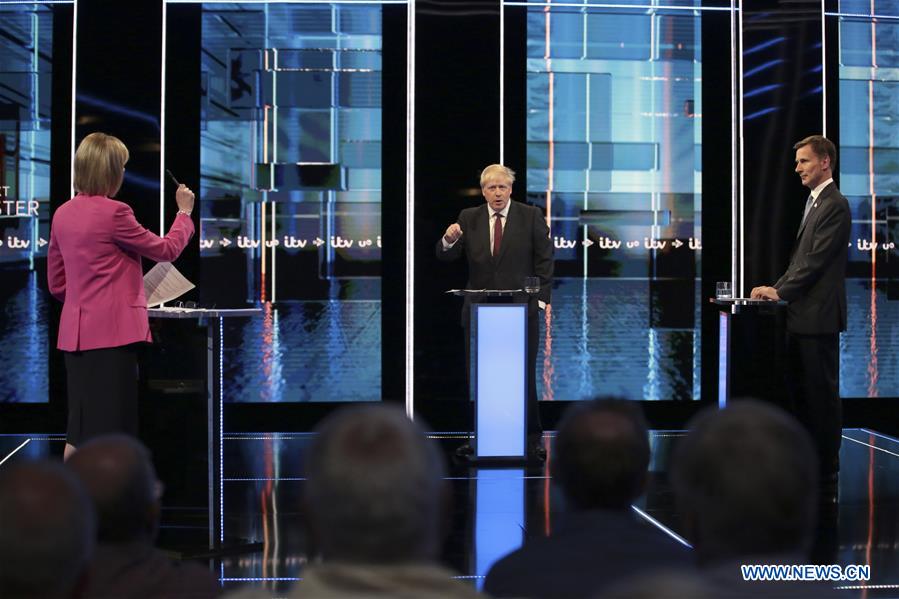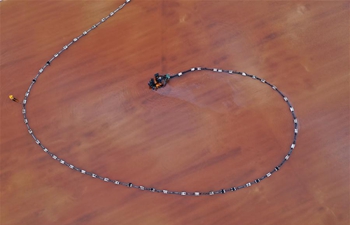
In this handout image provided by ITV, Host Julie Etchingham, Boris Johnson and Jeremy Hunt (L-R) take part in the Jeremy Hunt and Boris Johnson debate Head To Head on ITV in Salford, Britain, on July 9, 2019. Conservative Party leadership front-runner Boris Johnson repeated his pledge Tuesday to being Britain out of the European Union on Oct. 31 if he wins the battle to become the next prime minister. But in a head-to-head live televised debate with his rival, Foreign Secretary Jeremy Hunt, Johnson refused to say whether he would resign if he failed, and he would not be drawn on whether he would close down the House of Commons if politicians attempt to block a no-deal departure from the European Union. (Photo by Matt Frost/ITV via Xinhua)
LONDON, July 9 (Xinhua) -- Conservative Party leadership front-runner Boris Johnson repeated his pledge Tuesday to being Britain out of the European Union on Oct. 31 if he wins the battle to become the next prime minister.
But in a head-to-head live televised debate with his rival, Foreign Secretary Jeremy Hunt, Johnson refused to say whether he would resign if he failed, and he would not be drawn on whether he would close down the House of Commons if politicians attempt to block a no-deal departure from the European Union.
The often angry debate came as voting continues among 160,000 members of the Conservative Party to choose who they want as their leader to succeed current prime minister Theresa May.
Johnson faced his first challenge during the first question when Hunt asked him directly if he will resign if he fails to take Britain out of the EU by October 31.
Johnson responded saying it is important not to hold out any prospect of not coming out on that date, adding that making such a promise could encourage Brussels to delay.
Hunt tells the studio audience in Salford: "As a tough negotiator, I will deliver Brexit."
Both men insisted solutions could be found to one of the major stumbling blocks faced by Theresa May over how to solve the issue of future border arrangements between Northern Ireland and Ireland. The border between the two will be the only EU frontier within the British Isles.
The two leadership contenders were asked if a snap general election would be the outcome if the British parliament vetoed a no-deal Brexit.
Johnson said it was totally defeatist not to the October 31 departure date.
Hunt said that was why he is not setting October 31 as an absolute deadline, adding his birthday is on November 1 and he wants to celebrate it by bringing Britain out of the EU.
Hunt also insisted he would not shut-down parliament to get a no-deal through, adding: "The last time this was tried, we had a civil war," he added.
Johnson said it would be mistake to take anything off the negotiating table.
The focus switched to domestic issues with both men saying if they win they would make tax changes to help low income people, and both said they back the multi-billion pound HS2 high speed rail link between London and the north of England. Both also said they would keep a controversial welfare reform known as universal credit.
In what was often an acrimonious exchange between two men wanting the top job in British politics, commentators had mixed opinions on who came out as winner in the last big public clash between Johnson and Hunt.
Daily Telegraph opinion writer Tim Stanley commented: "In summary: Boris doesn't answer questions, Hunt gives answers no one wants to hear."
The Evening Standard in London said the duel was the final chance for Hunt to turn around the contest in which he has been the underdog throughout.
In its take on the clash, the Independent newspaper in London the debate was more heated than many people expected it to be, with both candidates landing several punches.
Hunt landed the most blows and pushed his rival well on several areas, including whether he would resign if he failed to deliver Brexit, and whether he would rule out proroguing (closing) parliament.
"Johnson seemed evasive throughout, and Hunt leapt on it," said the Independent.
The Independent described Hunt as calm and assured, appearing the most statesmanlike. But Johnson had some good barbs of his own, quickly turning Hunt's points about realism into accusations of negativity.
"Johnson's responses will go down well with the people who matter in this contest, Conservative members," added the analysis.
The big question is whether Johnson, the most likely person to be handed the keys to Downing Street on July 23, will offer his challenger a top job in his team of ministers.











